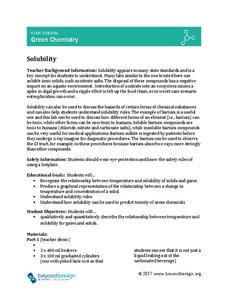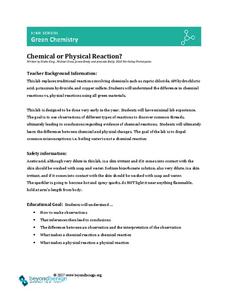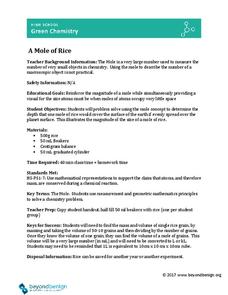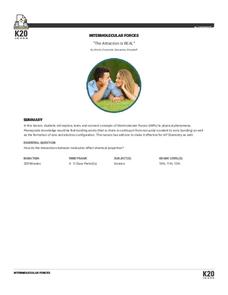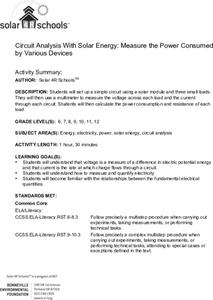Beyond Benign
Enthalpy of Combustion
Learn the facts about types of wax! Partnered pupils determine the enthalpy of combustion for traditional paraffin candles, as well as soy-based candles. The activity focuses on calculations and compares the environmental impact of both...
Beyond Benign
Exothermic and Endothermic Reactions
How can you tell the difference between endothermic and exothermic reactions? Chemistry scholars perform and observe two chemical reactions, measure the temperature throughout, then draw conclusions about changes in energy from their...
Beyond Benign
Solubility
Enhance your class' ability to understand solubility. Science scholars examine how temperature and concentration affect solubility using an interesting lab experiment. The introduction and procedure also discuss the relationship between...
Beyond Benign
Chemical or Physical Reaction?
Ready to take your chemistry class on its first big lab adventure? Dive in to differentiation between chemical and physical changes with a thoughtfully designed set of experiments! Partners conduct a series of reactions, describe their...
Beyond Benign
Mole of Rice Activity
Learning about the mole using rice is pretty nice! Help your chemistry scholars visualize the concept of a mole of substance with an easy-to-perform lab. Partnered pupils find the mass of a single grain of rice and relate this...
K20 LEARN
The Attraction is REAL
How attractive is your intermolecular forces lesson plan? Draw your class in with an activity that includes research, presentation, and demonstrations. Chemistry scholars work together to create claims about the each intermolecular...
Bonneville
Passive Solar Water Heating
Put empty milk jugs to good use. Scholars consider the characteristics they might change about a milk jug to improve light absorption. They design a passive solar water heater using the milk jug and then measure the temperature change in...
Bonneville
Using a Multimeter to Analyze a Solar Circuit: Measuring Current and Voltage—Calculating Power and Resistance
Power to the people who understand electricity. A simple experiment teaches pupils how to set up an electric circuit that includes a solar module and how to measure voltage and current using a multimeter. They calculate power and...
Bonneville
Circuit Analysis With Solar Energy: Measure the Power Consumed by Various Devices
Power up the class with a lesson on electronics. Scholars use a solar module to create an electric circuit. They connect different devices to the circuit and measure the voltage and current. Based on the measurements, they calculate the...
Bonneville
Photovoltaic Solutions "Shark-Tank Style"
Come up with a great idea and change the world for the better. Working in groups of three, learners apply their knowledge of photovoltaic systems to design a battery-powered electric vehicle capable of replacing gas-powered cars. They...
Bonneville
Designing a Solar Charger
The sun can even charge batteries. The fourth of five lessons in the Solar Transportation unit has pupils design a charger that uses solar modules to charge a 12-volt lead-acid battery. They estimate the charge that accumulates and...
Bonneville
Can Portable PV Charge Vehicles?
Take charge of learning about electric vehicles. Instructors first provide the class with information about PV modules and batteries. Learners then conduct an experiment where they connect PV modules in series and in parallel to...
Children’s Hospital of Philadelphia
Discovery and Development of Vaccines
Stop the spread. Pupils work through two activities to gain an understanding of vaccines and immunity. Learners research different types of vaccines and how they are made and explore the advantages and disadvantages of them. Using a...
Children’s Hospital of Philadelphia
Development of Disease and Infection
It's all in the cards. Using cards to simulate a disease's attack on the immune system, pupils develop an understanding of how the immune system and pathogens react to each other and why at times the pathogen wins. Groups play a game to...
Learning Games Lab
Understanding Water Activity
How does water activity play a role in food spoilage? First, the learners think about which types of foods would be best to take on a backpacking trip based on the water activity of different foods. It then walks through why water...
Learning Games Lab
Controlling Water Activity in Food
Food storage matters! Scholars learn how the amount of water in corn can affect its rate of spoilage. They create a control group, then test three corn samples stored in three different locations for water activity. As a result of the...
Learning Games Lab
The pH Scale and Meter Calibration
What are the different ways to test for pH? First, scholars explore the pH scale and a common way to test for acidity and alkalinity. Then, they learn about the importance of pH in food safety and why variance in pH could potentially...
Learning Games Lab
How to Use Oil Immersion Microscope
Teach the class how to use a microscope to identify bacteria in food. Scholars explore the different parts of the microscope and learn how to determine total magnification. They walk step-by-step through the procedure of preparing slides...
Learning Games Lab
Testing and Adjusting pH
Pupils learn how to control food spoilage by adjusting the food's pH. They see that one of the most dangerous bacteria can grow in food if people don't handle and store food properly. Using knowledge of the bacteria's preferred pH,...
Learning Games Lab
Gram Staining
Scholars use a lab simulation to test contaminated yogurt for bacteria by gram staining. They learn proper lab procedures for handling bacteria and for sterilizing equipment, and then walk through the process on their own to try gram...
Learning Games Lab
Bacteria Sampling
Scholars explore the procedure for bacteria sampling in a virtual lab by first walking through a detailed step-by-step procedure of preparing the samples of raw milk and pasteurized milk, growing the bacteria, and comparing results....
Learning Games Lab
Testing for Corn Mold
Learners complete a virtual lab to test for a corn mold that can lead to dangerous toxins. They walk through a detailed step-by-step procedure then see their findings. Throughout the activity, they learn how to use lab tools and practice...
Discovery Education
Urinalysis
What do lab tests reveal about a patient's health? Scholars perform a simulated urinalysis on two different patients by testing color, pH, glucose levels, and protein levels. Then, they compare their findings to what they know passes...
Howard Hughes Medical Institute
Pulse Chase Primer: The Meselson-Stahl Experiment
Experimental design can make or break an experiment. Young scholars analyze the pulse-chase analysis procedure by studying the Meselson-Stahl experiment. Using a video presentation, they discover how the pulse-chase analysis led to the...




